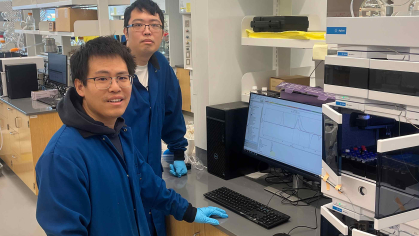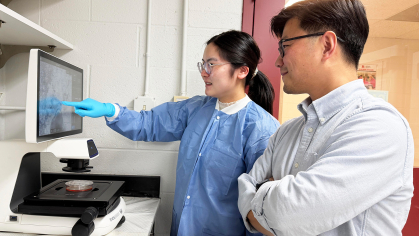Rutgers Students Sift Through Social Media in Search of Emerging Threats From Extremist Behavior and Disinformation

Student researchers at Rutgers University are helping faculty and national security experts research emerging threats stemming from extremist behavior and disinformation on social media.
The students are involved in a pilot partnership between the Network Contagion Research Institute (NCRI), a nonprofit organization that studies misinformation, deception manipulation and hate across social media channels and two centers at Rutgers: the Miller Center for Community Protection and Resilience and the Center for Critical Intelligence Studies, a federally designated Intelligence Community Center for Academic Excellence.
“Ben Franklin qualified the creation of our new nation as ‘A republic, if you can keep it,’” said John J. Farmer Jr., director of the Eagleton Institute of Politics and the Miller Center. “The best way to keep it in today's world is to understand the threat posed to our democracy by the misuse of social media to foment extremism through mis- and disinformation. This program enables our students to gain that understanding."
Known as the NC Lab at Rutgers, the partnership gives undergraduate students the opportunity for multidisciplinary training in geography, psychology, computer science and statistics as well as modeling and machine learning. Grouped into intelligence teams, students work with experts from NCRI and the Miller Center to develop reports and analyses.
Cristian Ramos, a Rutgers senior studying information technology and Informatics as well as critical intelligence studies, said the NC Lab provided an opportunity to develop data collection and analysis skills “and put them to the test by creating visualizations to represent our findings.”
“I observed how disinformation campaigns affect many different facets of a society, including the economy and free market,” Ramos said.
Using NCRI open-source data involving over 100 billion of online comments, aggregated public databases, event data, open web material and mainstream media sites, students focus on several critical areas, including:
- State actor/troll analysis
- Interactions between online ideologies and real-world violence and events
- Public health disinformation
- Race, ethnicity and ancestry bias and hate
Prasiddha Sudhakar, a senior at Rutgers studying computer science, economics and critical intelligence studies, was part of an NC Lab team that included analysts, crypto experts and student researchers.
Sudhakar said team members “leveraged computational research and collection methods to run analysis on data to identify prevalent memes and narratives utilized in spreading disinformation campaigns about particular markets of interest,”
Sudhakar added that “being able to see exactly how intelligence is gathered was invaluable to my academic experience.”
Rutgers students involved in the program underwent “unparalleled training” in the course of one semester to become “skilled analysts both in open source intelligence, programming and analysis,” said Joel Finkelstein, director of the NCRI and a senior research fellow at the Miller Center.
“They are the next generation of threat analysts that will help make communities more resilient and secure in the digital age,” said Finkelstein, adding that the students come from “numerous disciplines.”
Ava Majlesi, director of the CCIS and associate director of the Miller Center, said the goal is to give students from a variety of backgrounds “the education, skills and tools they need to potentially pursue a career in the intelligence community and a firm grasp of the responsibility they have to uphold constitutional freedoms if this is the path they choose.”
Learn more about the student research fellowship program involving NCRI and read the lab’s latest reports.


